Defining Splicing Factor Requirements for Androgen Receptor Variant Synthesis in Advanced Prostate Cancer
- PMID: 39348093
- PMCID: PMC11612623
- DOI: 10.1158/1541-7786.MCR-23-0958
Defining Splicing Factor Requirements for Androgen Receptor Variant Synthesis in Advanced Prostate Cancer
Abstract
Resistance to androgen receptor (AR)-targeted therapies represents a major challenge in prostate cancer. A key mechanism of treatment resistance in patients who progress to castration-resistant prostate cancer (CRPC) is the generation of alternatively spliced AR variants (AR-V). Unlike full-length AR isoforms, AR-Vs are constitutively active and refractory to current receptor-targeting agents and hence drive tumor progression. Identifying regulators of AR-V synthesis may therefore provide new therapeutic opportunities in combination with conventional AR-targeting agents. Our understanding of AR transcript splicing, and the factors that control the synthesis of AR-Vs, remains limited. Although candidate-based approaches have identified a small number of AR-V splicing regulators, an unbiased analysis of splicing factors important for AR-V generation is required to fill an important knowledge gap and furnish the field with novel and tractable targets for prostate cancer treatment. To that end, we conducted a bespoke CRISPR screen to profile splicing factor requirements for AR-V synthesis. MFAP1 and CWC22 were shown to be required for the generation of AR-V mRNA transcripts, and their depletion resulted in reduced AR-V protein abundance and cell proliferation in several CRPC models. Global transcriptomic analysis of MFAP1-depleted cells revealed both AR-dependent and -independent transcriptional impacts, including genes associated with DNA damage response. As such, MFAP1 downregulation sensitized prostate cancer cells to ionizing radiation, suggesting that therapeutically targeting AR-V splicing could provide novel cellular vulnerabilities which can be exploited in CRPC. Implications: We have utilized a CRISPR screening approach to identify key regulators of pathogenic AR splicing in prostate cancer.
©2024 The Authors; Published by the American Association for Cancer Research.
Conflict of interest statement
C. Crafter reports employment with AstraZeneca and ownership of AstraZeneca shares. D.J. O’Neill reports employment with AstraZeneca and ownership of AstraZeneca shares. No disclosures were reported by the other authors.
Figures
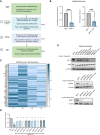
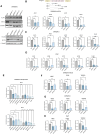
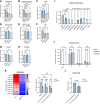

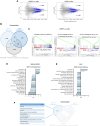

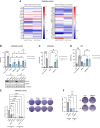
References
-
- Westaby D, Viscuse PV, Ravilla R, de la Maza MLDF, Hahn A, Sharp A, et al. . Beyond the androgen receptor: the sequence, the mutants, and new avengers in the treatment of castrate-resistant metastatic prostate cancer. Am Soc Clin Oncol Educ Book 2021;41:e190–202. - PubMed
-
- Ross RW, Xie W, Regan MM, Pomerantz M, Nakabayashi M, Daskivich TJ, et al. . Efficacy of androgen deprivation therapy (ADT) in patients with advanced prostate cancer: association between Gleason score, prostate-specific antigen level, and prior ADT exposure with duration of ADT effect. Cancer 2008;112:1247–53. - PubMed
-
- Attard G, Murphy L, Clarke NW, Cross W, Jones RJ, Parker CC, et al. . Abiraterone acetate and prednisolone with or without enzalutamide for high-risk non-metastatic prostate cancer: a meta-analysis of primary results from two randomised controlled phase 3 trials of the STAMPEDE platform protocol. Lancet 2022;399:447–60. - PMC - PubMed
Publication types
MeSH terms
Substances
Grants and funding
LinkOut - more resources
Full Text Sources
Research Materials
Miscellaneous

